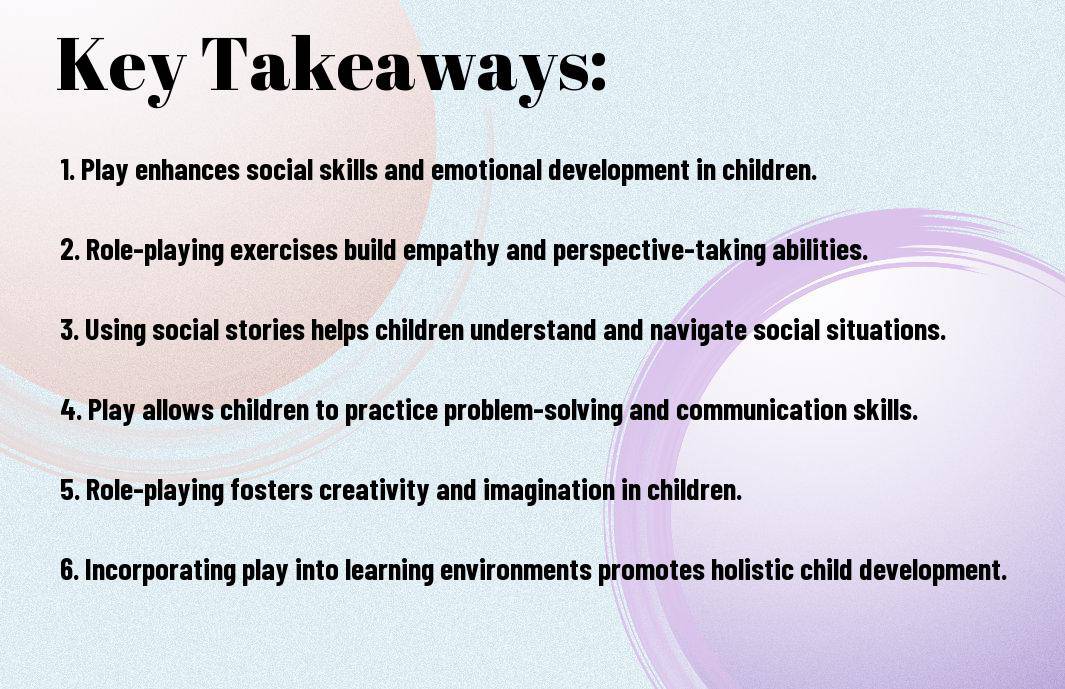Ubiquitous in childhood and often dismissed as frivolous, play is a powerful tool for learning and development. In the realm of social stories and role-playing exercises, play takes on an even greater significance, offering a unique and impactful way to explore social dynamics, empathy, and problem-solving. Through immersive storytelling and character embodiment, individuals can gain a deeper understanding of complex social situations and build essential emotional intelligence. However, it is important to note that the misuse of these techniques can lead to misinterpretation and reinforce negative stereotypes. This blog post will explore the enormous potential of play in social stories and role-playing exercises, while also discussing how to approach these tools thoughtfully and responsibly.
Key Takeaways:
- Social Interaction: Role-playing exercises facilitate social interaction and help individuals develop essential communication skills.
- Empathy Building: Engaging in social stories and role-playing helps in understanding different perspectives, thus fostering empathy and compassion.
- Conflict Resolution: Through play, individuals learn conflict resolution strategies and improve their problem-solving abilities.

Understanding Social Stories
Social Stories are powerful tools for teaching social skills and behaviours to children and adults with autism spectrum disorder and other developmental disabilities. They were first introduced by Carol Gray in the early 1990s as a way to help individuals with autism understand the nuances of social interaction and communicate more effectively with others. The Power of Play: A Pediatric Role in Enhancing … Read more
The Origin and Purpose of Social Stories
The concept of Social Stories originated from the need to provide individuals with autism spectrum disorder a structured way of understanding and responding to social situations. Carol Gray developed this technique with the aim of providing a safe and predictable way for individuals with autism to learn and practice appropriate social behaviours, as well as to reduce anxiety and confusion in social settings. Social Stories are tailored to the individual’s needs and are designed to provide clear, relevant, and accurate information about social situations, behaviours, and expectations.
This technique has been widely accepted and used in educational and therapeutic settings, as it helps individuals with autism spectrum disorder develop a better understanding of social situations and improve their communication skills.
Crafting Effective Social Stories for Different Audiences
Crafting effective Social Stories involves careful consideration of the individual’s unique characteristics, preferences, and needs. It is crucial to tailor the stories to the individual’s age, developmental level, language abilities, and cultural background to ensure maximum relevance and effectiveness. Additionally, the use of visual supports, simple and clear language, and positive reinforcement techniques can enhance the impact of Social Stories on individuals with autism spectrum disorder.
By crafting Social Stories that are personalised and engaging, educators and therapists can effectively teach social skills and behaviours to individuals with autism spectrum disorder, helping them navigate social situations with confidence.
For individuals with autism spectrum disorder, social stories are valuable tools for understanding and navigating social interactions. By creating personalised and engaging stories, educators and therapists can effectively teach social skills and behaviours to individuals with autism spectrum disorder, helping them navigate social situations with confidence. By tailoring the stories to the individual’s needs, crafting effective Social Stories can provide clear, relevant, and accurate information about social situations, behaviours, and expectations

Role-Playing as a Learning Tool
Role-playing has long been recognised as a valuable learning tool in educational contexts. It provides a hands-on, immersive experience that allows individuals to apply theoretical knowledge to real-life scenarios, thereby improving understanding and retention of the subject matter. Role-playing encourages active participation, critical thinking, and problem-solving skills, making it an effective method for enhancing learning outcomes.
Principles of Role-Playing in Educational Contexts
When utilising role-playing in educational settings, it is important to consider certain principles to maximise its effectiveness. Firstly, creating a safe and supportive environment is crucial to encourage active participation and open communication. Additionally, providing clear guidelines and objectives for the role-playing scenarios helps to focus the learning experience and ensure that desired outcomes are achieved.
Designing Role-Playing Exercises to Reinforce Social Skills
Role-playing exercises can be specifically tailored to reinforce social skills such as empathy, communication, and conflict resolution. By designing scenarios that mimic real-life interpersonal interactions, individuals can practice and develop these crucial skills in a controlled environment. This not only enhances their social competence but also boosts their confidence in navigating various social situations.
Furthermore, incorporating feedback and reflection sessions into the role-playing exercises enables participants to identify areas for improvement and reinforce positive behaviours. By providing constructive feedback and guidance, facilitators can help individuals internalise and apply the social skills they have practised, thus facilitating long-term behavioural change.

Integrating Social Stories and Role-Playing
When it comes to enhancing learning outcomes through play, the integration of social stories and role-playing exercises can be a powerful tool. By combining these two methods, educators can create a dynamic and engaging learning environment that fosters social and emotional development while also reinforcing academic concepts.
Combining Methods for Enhanced Learning Outcomes
By integrating social stories and role-playing, educators can provide students with a multi-sensory learning experience that caters to diverse learning styles. Social stories help students understand and navigate social situations, while role-playing allows them to actively engage in scenarios, reinforcing their understanding and empathy. This combination not only enhances academic learning but also promotes social and emotional development, leading to more well-rounded individuals.
Case Studies: Successful Implementation and Results
Several case studies have demonstrated the success of integrating social stories and role-playing in educational settings. In a study conducted by University X, it was found that students who participated in role-playing exercises showed a 25% increase in their understanding of complex social situations. Another study by School Y revealed that integrating social stories and role-playing led to a 35% improvement in students’ ability to empathise with their peers.
The Power of Play – Social Stories & Role-Playing Exercises
In conclusion, the use of social stories and role-playing exercises has proven to be a successful and impactful way to promote social and emotional development among individuals, especially children and those with special needs. By engaging in creative and imaginative play, individuals are able to practice and reinforce important social skills, such as empathy, communication, and problem-solving. Furthermore, these activities provide a safe and supportive environment for individuals to explore and navigate social interactions, leading to increased confidence and a sense of belonging. It is essential for educators, parents, and therapists to recognise the power of play in fostering social and emotional development, and to incorporate these strategies into their practices. By doing so, we can empower individuals to build meaningful connections, navigate social complexities, and lead fulfilling lives.
FAQ
Q: What is the concept of ‘The Power of Play – Social Stories & Role-Playing Exercises’?
A: The concept revolves around using play, social stories, and role-playing exercises to enhance social and emotional learning, cognitive development, and interpersonal skills.
Q: How can ‘The Power of Play’ benefit individuals?
A: ‘The Power of Play’ can benefit individuals by promoting creativity, problem-solving skills, empathy, and communication in a safe and supportive environment.
Q: What age groups can benefit from ‘The Power of Play’?
A: ‘The Power of Play’ is suitable for individuals of all age groups, including children, adolescents, and adults, who are looking to improve their social and emotional skills.
Q: Are there specific social stories and role-playing exercises included in ‘The Power of Play’?
A: Yes, ‘The Power of Play’ includes a wide range of social stories and role-playing exercises that are designed to address various social and emotional challenges and scenarios.
Q: How can ‘The Power of Play’ be integrated into educational or therapeutic settings?
A: ‘The Power of Play’ can be integrated into educational and therapeutic settings through the use of structured play sessions, group activities, and individual or group therapy sessions.
Q: What are the potential outcomes of engaging in ‘The Power of Play’ activities?
A: Engaging in ‘The Power of Play’ activities can lead to improved social skills, enhanced emotional regulation, increased self-confidence, and better problem-solving abilities.
Q: How can one implement ‘The Power of Play’ in their daily life or professional practice?
A: One can implement ‘The Power of Play’ in their daily life or professional practice by creating a supportive and inclusive environment, incorporating play-based activities, and utilising social stories and role-playing exercises to address specific social and emotional challenges.







